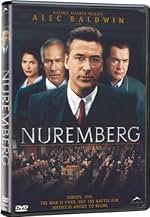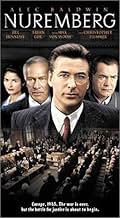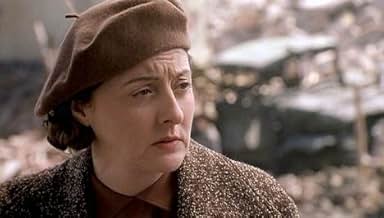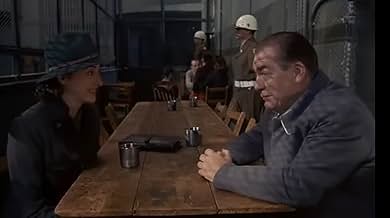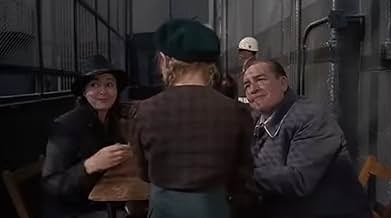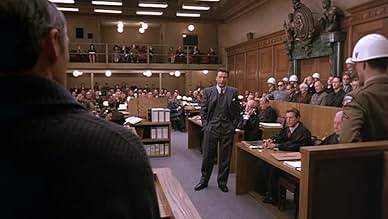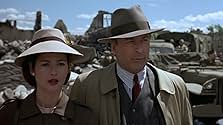Der dramatisierte Bericht über die Kriegsverbrecherprozesse nach der Niederlage Nazideutschlands im Zweiten Weltkrieg.Der dramatisierte Bericht über die Kriegsverbrecherprozesse nach der Niederlage Nazideutschlands im Zweiten Weltkrieg.Der dramatisierte Bericht über die Kriegsverbrecherprozesse nach der Niederlage Nazideutschlands im Zweiten Weltkrieg.
- 2 Primetime Emmys gewonnen
- 10 Gewinne & 33 Nominierungen insgesamt
Folgen durchsuchen
Empfohlene Bewertungen
This is a strange subject for a modern TV series designed to entice an audience to whom World War II is as distant as the Pelopenesian Wars. Yet this is a tough, well produced, historically accurate and thoroughly compelling film. Brian Cox steals the show with a masterful recreation of Hermann Goering as a beguiling rogue. And the production techniques excel, for example the sound track as silent film of the concentration camps is shown to the trial. It puts the horror in context without exploiting it or sensationalizing it. A brilliant piece of historical film making.
Well done, as television movies go. There seems to have been a substantial budget and an awful lot of research behind it. There are times when points and characters are overstated, but it's an improvement over "Judgment at Nuremberg." This film puts the Nazi leaders on trial and finds most of them guilty of crimes against humanity, while others are sentenced to prison. "Judgment at Nuremberg" put the entire nation of Germany on trial, handed the thankless task of defending Germany's role in World War II to Maximilion Schell, and found every German who ever breathed to be guilty of every sin that's ever been committed in the history of humankind. The scriptwriter, Abby Mann, accepted his Academy Award "in the name of all intellectuals everywhere." This modest production fills in many of the blanks that are missing from the public's understanding of the Nuremberg trials. Where, for instance, did the prisoners and staff of the trials find housing in Nuremberg, an ancient city that had been flattened by Allied bombing and in which there were still hundreds of decomposing bodies beneath the rubble? And did all the four major powers -- the US, Britain, France and Russia agree on the format and the procedures? Answer: No, the Russians and the French, who had suffered most under Nazissm, wanted summary executions of all the bigwigs. The subject is dead serious but the program has its quietly amusing moments -- the brash, ugly Russian representative trying to persuade the horrified French representative that he should lace his fine wine with a good belt of vodka. It has the limitations of most commercial productions. The Russian guy really IS ugly, and almost all the Germans are played by men with names like O'Keefe. There are many choker closeups, a technique that befits the small screen.
The Nazi leaders of course are villains of the worst sort but they're shown as humans too. After the surrender, an ebullient Goering, Brian Cox, unexpectedly drives up to an American Air Force base with his wife and child, dismounts from his chauffeur-driven car, and formally hands over his sword to an astounded General Spaatz -- "one airman to another." After being feted publicly, the victors soon round him up and place him in a cell, as had been done with the other prisoners. An American lieutenant, Tex Wheeler, is posted as Goering's personal guard. Scott Gibson gives a convincing performance. Wheelis will play a larger role in Goering's fate later.
Alex Baldwin is Robert H. Jackson, who more or less runs the show. His assistant Jill Hennessy is a fox and the rest of the cast is quite good. There are too many airy conversations about moral superiority and the viewer is urged to want Baldwin to treat Georing on the stand as the despicable, conniving swine he is. Should he? How does the word "disinterested" differ from "uninterested"? The most chilling testimony comes from the Commandant of Auschwitz, who describes the camp's activities precisely and dispassionately -- showing neither indignation or remorse.
Unfortunately, the prosecution insists on presenting not just documentary evidence but witnesses too, in order to deliberately heighten the drama behind the trial. It's pretty sickening, naturally, and to many adults it's repetitive. We know about the medical experiments in which Jews were kept in freezing water until they died. And so we sit through the familiar revolting images of the charred skeleton in the oven, the walking cadavers, the old man praying as he lies on a stretcher, the waxlike naked bodies piled on one another in mounds, the bulldozer shoveling them into the empty pit. I doubt that anyone needs to be REMINDED of what happened. But maybe it's just as well that we go through it all again because I'm not sure how much of this material has faded from our collective memory. One in six English youngsters thought Auschwitz was a World War II theme park, and one in six thought Hitler was a football coach.
And, at that, there are some insights into what has always been a blank at least in my mind. Goering was head of the Luftwaffe. So? What did he have to do with the treatment of the Jews and other devalued minorities? Simple. The experiments that froze subjects to death in ice water were undertaken at his request in order to discover how Luftwaffe crew might best survive if shot down in northern waters. Except for a few, the defendants all seem like unregenerate Nazis. Well, except for Rudolf Hess too, because he was nuts. It may seem like a mistake to have Julius Streicher portrayed as a rabid anti-Semite, pounding the table, ranting against Jews, his features in a cataleptic sneer. But that was the kind of guy he really was. He wasn't a military man but his railing against the Jews amounted to paranoia. He combed the pages of the Talmud and the Old Testament in search of passages that painted Judaism as harsh or cruel, rather like some of us are now doing with the Koran. It's easy.
Some of the prisoners, like Albert Speer, the architect who became Hitler's Armaments Minister, admit their guilt. Others rely on the rationale that they were only following orders. This excuse is always dismissed by civilized people but mistakenly in my opinion.
Not in this case, perhaps, but for "only following orders" substitute "doing what I was expected to do," and we're all guilty, even if the "orders" are sometimes unspoken, in which case they're known as "command pressure" or "peer pressure" or "keeping up with the Joneses." One doubtful ex-Nazi, Hans Frank, puts it this way: "I wanted to keep my job." Suppose, instead of "job", we substitute "public opinion" or "the respect of my community"? From a sociological point of view, the intricacies are myriad.
The Nazi leaders of course are villains of the worst sort but they're shown as humans too. After the surrender, an ebullient Goering, Brian Cox, unexpectedly drives up to an American Air Force base with his wife and child, dismounts from his chauffeur-driven car, and formally hands over his sword to an astounded General Spaatz -- "one airman to another." After being feted publicly, the victors soon round him up and place him in a cell, as had been done with the other prisoners. An American lieutenant, Tex Wheeler, is posted as Goering's personal guard. Scott Gibson gives a convincing performance. Wheelis will play a larger role in Goering's fate later.
Alex Baldwin is Robert H. Jackson, who more or less runs the show. His assistant Jill Hennessy is a fox and the rest of the cast is quite good. There are too many airy conversations about moral superiority and the viewer is urged to want Baldwin to treat Georing on the stand as the despicable, conniving swine he is. Should he? How does the word "disinterested" differ from "uninterested"? The most chilling testimony comes from the Commandant of Auschwitz, who describes the camp's activities precisely and dispassionately -- showing neither indignation or remorse.
Unfortunately, the prosecution insists on presenting not just documentary evidence but witnesses too, in order to deliberately heighten the drama behind the trial. It's pretty sickening, naturally, and to many adults it's repetitive. We know about the medical experiments in which Jews were kept in freezing water until they died. And so we sit through the familiar revolting images of the charred skeleton in the oven, the walking cadavers, the old man praying as he lies on a stretcher, the waxlike naked bodies piled on one another in mounds, the bulldozer shoveling them into the empty pit. I doubt that anyone needs to be REMINDED of what happened. But maybe it's just as well that we go through it all again because I'm not sure how much of this material has faded from our collective memory. One in six English youngsters thought Auschwitz was a World War II theme park, and one in six thought Hitler was a football coach.
And, at that, there are some insights into what has always been a blank at least in my mind. Goering was head of the Luftwaffe. So? What did he have to do with the treatment of the Jews and other devalued minorities? Simple. The experiments that froze subjects to death in ice water were undertaken at his request in order to discover how Luftwaffe crew might best survive if shot down in northern waters. Except for a few, the defendants all seem like unregenerate Nazis. Well, except for Rudolf Hess too, because he was nuts. It may seem like a mistake to have Julius Streicher portrayed as a rabid anti-Semite, pounding the table, ranting against Jews, his features in a cataleptic sneer. But that was the kind of guy he really was. He wasn't a military man but his railing against the Jews amounted to paranoia. He combed the pages of the Talmud and the Old Testament in search of passages that painted Judaism as harsh or cruel, rather like some of us are now doing with the Koran. It's easy.
Some of the prisoners, like Albert Speer, the architect who became Hitler's Armaments Minister, admit their guilt. Others rely on the rationale that they were only following orders. This excuse is always dismissed by civilized people but mistakenly in my opinion.
Not in this case, perhaps, but for "only following orders" substitute "doing what I was expected to do," and we're all guilty, even if the "orders" are sometimes unspoken, in which case they're known as "command pressure" or "peer pressure" or "keeping up with the Joneses." One doubtful ex-Nazi, Hans Frank, puts it this way: "I wanted to keep my job." Suppose, instead of "job", we substitute "public opinion" or "the respect of my community"? From a sociological point of view, the intricacies are myriad.
Magnificent film based on actual events with top-notch performances throughout proceeded by a decent star cast and specially by Baldwin , Cox , Plummer , Sydow , Heyerdahl and Len Cariou as supreme judge who presides over the trials , among others . A stimulating portrayal of the Nuremberg trials in which members of the German authorities were brought to response their crimes in the immediate post-war period .
Supreme court Justice , judge Robert H Jackson (Alec Baldwin) is asked to head up the prosecution and he decides to try a representative sample of third Reich leaders , including Hitler's 2º man Hermann Goering (Brian Cox) . The movie initiates with scenes of Núremberg , Germany , 1948 , the destruction of the war is clear everywhere , there Robert is driven through the ruined buildings . The court is formed by three judges to preside the trial against the Nazi chiefs for their complicity in Third Reich . As Robert Jackson in charge of Allied prosecution Nazi war who must resist political pressures and speeches against him , being helped by his assistant Elsie Douglas (Jill Hennessy) . In its opening declaration , the prosecution calls these defendants to account not for violation of due process or other constitutional violations but for killings , tortures , and cruelties committed during WWII . Considers to what extent an individual may be held accountable for actions committed of a superior officer . The accuser statements that the accused cannot claim ignorance that they should have known better for their high position and knowledge . And defenders argue the disobedience to the Fuehrer would have been choice between patriotism and treason for the justices with the subsequent firing squad . Finally the defending councillors explain that not only are the high staff on trial , so are the German people . They claim that the extremists are responsible , not the defendants . They say that very few Germans knew what was going on . Defense lawyers give us the uneasy feeling that the German people never really came to terms with their innocence or guilty . They claimed that the defendants stayed in their positions to keep things from getting worse . One of the more dramatic portions of the film centers around Prosecutor Robert Jackson submitted documents by which the judges and prosecutors had sent thousands to their deaths . A film was shown , a short-documentary is based on real events by means of photographs and stock-footage . As appears work camps are transformed into extermination centers to implement the policy of genocide thought at the Wannsee Conference . At the concentration camps was some minor industrial activity linked to the war effort but the main work was the execution of inmates . Millions of prisoners died in the concentration camps through mistreatment , disease, starvation, and overwork, or were executed as unfit for labor. More than six million Jews died in them, usually in gas chambers, although many were killed in mass shootings and by other means . As the documentary showed a gas chamber at Dachau , but it is a mistake because of it was never used, prisoners died from mistreatment or from execution by means other than gas . The archival footage shows tattooed skin , but Buchenwald prisoners with unusual tattoos were killed , then their skin was preserved for the tattoo collection of convicted war criminal Ilse Koch .
This is a graphic and thought-provoking account of the Nuremberg trials in which a group of high-level hierarchy are on trial , being judged in the immediate post-war period ; and subsequently brought to book by Joseph E. Persico , as this picture is based on his novel titled ¨Núremberg : Infamy on trial¨ . This consuming as well as provoking retelling contains some interesting trial scenes that generally work but there's also the needless byplay of a love story between prosecutor attorney Robert/Baldwin and his secretary/Hennessy . Prosecutor Robert H. Jackson is perfectly played by Alec Baldwin , he gives a very good acting for his impassioned portrayal of the accusation against the nasty Nazis . And also superb : Herbert Knaup as Albert Speer , Christopher Heyerdahl as Ernst Kaltenbrunner , Colm Feore as Rudolf Höß , Fournier as Reichsminister Alfred Rosenberg , Cloutier as admiral Karl Dönitz , Frank Moore as Hans Frank , René Gagnon as Reichsminister Arthur Seyß-Inquart , Benoît Girard as Joachim Von Ribbentrop , Dennis St John as Franz Von Papen , LaFortune as Rudolf Hess , Sam Stone as Julius Streicher and , of course , the always chilling Brian Cox . This deeply moving and powerful film was well -but not overly compelling- directed by Yves Simoneau . Rating : Good , better than average .
Supreme court Justice , judge Robert H Jackson (Alec Baldwin) is asked to head up the prosecution and he decides to try a representative sample of third Reich leaders , including Hitler's 2º man Hermann Goering (Brian Cox) . The movie initiates with scenes of Núremberg , Germany , 1948 , the destruction of the war is clear everywhere , there Robert is driven through the ruined buildings . The court is formed by three judges to preside the trial against the Nazi chiefs for their complicity in Third Reich . As Robert Jackson in charge of Allied prosecution Nazi war who must resist political pressures and speeches against him , being helped by his assistant Elsie Douglas (Jill Hennessy) . In its opening declaration , the prosecution calls these defendants to account not for violation of due process or other constitutional violations but for killings , tortures , and cruelties committed during WWII . Considers to what extent an individual may be held accountable for actions committed of a superior officer . The accuser statements that the accused cannot claim ignorance that they should have known better for their high position and knowledge . And defenders argue the disobedience to the Fuehrer would have been choice between patriotism and treason for the justices with the subsequent firing squad . Finally the defending councillors explain that not only are the high staff on trial , so are the German people . They claim that the extremists are responsible , not the defendants . They say that very few Germans knew what was going on . Defense lawyers give us the uneasy feeling that the German people never really came to terms with their innocence or guilty . They claimed that the defendants stayed in their positions to keep things from getting worse . One of the more dramatic portions of the film centers around Prosecutor Robert Jackson submitted documents by which the judges and prosecutors had sent thousands to their deaths . A film was shown , a short-documentary is based on real events by means of photographs and stock-footage . As appears work camps are transformed into extermination centers to implement the policy of genocide thought at the Wannsee Conference . At the concentration camps was some minor industrial activity linked to the war effort but the main work was the execution of inmates . Millions of prisoners died in the concentration camps through mistreatment , disease, starvation, and overwork, or were executed as unfit for labor. More than six million Jews died in them, usually in gas chambers, although many were killed in mass shootings and by other means . As the documentary showed a gas chamber at Dachau , but it is a mistake because of it was never used, prisoners died from mistreatment or from execution by means other than gas . The archival footage shows tattooed skin , but Buchenwald prisoners with unusual tattoos were killed , then their skin was preserved for the tattoo collection of convicted war criminal Ilse Koch .
This is a graphic and thought-provoking account of the Nuremberg trials in which a group of high-level hierarchy are on trial , being judged in the immediate post-war period ; and subsequently brought to book by Joseph E. Persico , as this picture is based on his novel titled ¨Núremberg : Infamy on trial¨ . This consuming as well as provoking retelling contains some interesting trial scenes that generally work but there's also the needless byplay of a love story between prosecutor attorney Robert/Baldwin and his secretary/Hennessy . Prosecutor Robert H. Jackson is perfectly played by Alec Baldwin , he gives a very good acting for his impassioned portrayal of the accusation against the nasty Nazis . And also superb : Herbert Knaup as Albert Speer , Christopher Heyerdahl as Ernst Kaltenbrunner , Colm Feore as Rudolf Höß , Fournier as Reichsminister Alfred Rosenberg , Cloutier as admiral Karl Dönitz , Frank Moore as Hans Frank , René Gagnon as Reichsminister Arthur Seyß-Inquart , Benoît Girard as Joachim Von Ribbentrop , Dennis St John as Franz Von Papen , LaFortune as Rudolf Hess , Sam Stone as Julius Streicher and , of course , the always chilling Brian Cox . This deeply moving and powerful film was well -but not overly compelling- directed by Yves Simoneau . Rating : Good , better than average .
Brian Cox picks this mini-series up by the scruff of the neck and runs off with it. It is an amazing testimonial to his talent and his craft that he suceeds in making Field Marshall Hermann Goerring the most appealing and charming character in this rehash of the Nuremburg trials. His "seduction" of the young American non-com is not only plausible but gratifying. It is amazing that this performance has one cheering on the second in command of the Third Reich as he cheats the hangman's noose.
My first impression of this film was that it was excellently done. It provoked my curiosity and I am glad to say the film held up under my further investigation of the trials.
The accurate representation of the grayness of a subject most would consider black and white was particularly courageous. It would be easy to paint the Nazis as monsters without souls, but so often terrible things are done by perfectly ordinary people. In fact that is what is so terrible about people's actions in WWII. Malevolence would certainly be easier to accept than what this film shows was at the source of the Nazi behavior -- indifference and lack of empathy. Who hasn't felt indifference toward someone they met in everyday life, the cashier who was too slow, the person in the car ahead, the telemarketer?
The acting was excellent, particularly Brian Cox, who showed us how well charm can mask evil. I did not think Goering was white-washed. This was shown most clearly in his pathetic attempt to shrug off the concentration camp film. Even his manipulative skill couldn't ease that shock, and his American friend was silent. If Alex Baldwin pumped up his drama a little, well, take a look at transcripts of the trial, which are drier than the Sahara. The use of documents was extensive during the trial and how often does the layperson want to hear that? The use of the concentration camp film was a cold dash of water in the face of such dryness. Some other comments question the inclusion of the relationship between Jackson and his secretary. I didn't see it as a "love story", but more as an "adultery story" used to show on a more personal level that despite his side's claim to superior "morals" Jackson was also weak. I think the Soviet involvement and the Polish massacre was left out because it would have been too long to include in all its convolutions. It is an interesting part of the story, however, so I recommend researching it.
I was glad to see on the comments that those who know more than I pointed out its accuracy. Too rarely does Hollywood actually attempt that.
The accurate representation of the grayness of a subject most would consider black and white was particularly courageous. It would be easy to paint the Nazis as monsters without souls, but so often terrible things are done by perfectly ordinary people. In fact that is what is so terrible about people's actions in WWII. Malevolence would certainly be easier to accept than what this film shows was at the source of the Nazi behavior -- indifference and lack of empathy. Who hasn't felt indifference toward someone they met in everyday life, the cashier who was too slow, the person in the car ahead, the telemarketer?
The acting was excellent, particularly Brian Cox, who showed us how well charm can mask evil. I did not think Goering was white-washed. This was shown most clearly in his pathetic attempt to shrug off the concentration camp film. Even his manipulative skill couldn't ease that shock, and his American friend was silent. If Alex Baldwin pumped up his drama a little, well, take a look at transcripts of the trial, which are drier than the Sahara. The use of documents was extensive during the trial and how often does the layperson want to hear that? The use of the concentration camp film was a cold dash of water in the face of such dryness. Some other comments question the inclusion of the relationship between Jackson and his secretary. I didn't see it as a "love story", but more as an "adultery story" used to show on a more personal level that despite his side's claim to superior "morals" Jackson was also weak. I think the Soviet involvement and the Polish massacre was left out because it would have been too long to include in all its convolutions. It is an interesting part of the story, however, so I recommend researching it.
I was glad to see on the comments that those who know more than I pointed out its accuracy. Too rarely does Hollywood actually attempt that.
Wusstest du schon
- WissenswertesBrian Cox claimed that the sequence in which the courtroom is shown a film of Nazi concentration camps required numerous takes. With the actual film being projected, genuine walkouts occurred on-set from crew members who couldn't take watching it anymore.
- PatzerAt the end of the trial, Field Marshall Wilhelm Keitel is referred to as "Admiral Keitel."
- Zitate
Reichsmarschall Hermann Wilhelm Göring: One German, a fine man. Two Germans, a bund. Three Germans, a war. One Englishman, an idiot. Two Englishmen, a club. Three Englishmen, an Empire.
- VerbindungenFeatured in The 58th Annual Golden Globe Awards 2001 (2001)
- SoundtracksDeep in the Heart of Texas
Written by June Hershey and Don Swander
Performed by cast
Melody Lane Music c/o Peermusic International
Top-Auswahl
Melde dich zum Bewerten an und greife auf die Watchlist für personalisierte Empfehlungen zu.
- How many seasons does Nuremberg have?Powered by Alexa
Details
- Erscheinungsdatum
- Herkunftsländer
- Offizieller Standort
- Sprachen
- Auch bekannt als
- Nuremberg
- Drehorte
- Produktionsfirmen
- Weitere beteiligte Unternehmen bei IMDbPro anzeigen
- Laufzeit
- 1 Std. 30 Min.(90 min)
- Farbe
- Sound-Mix
- Seitenverhältnis
- 1.85 : 1
Zu dieser Seite beitragen
Bearbeitung vorschlagen oder fehlenden Inhalt hinzufügen



